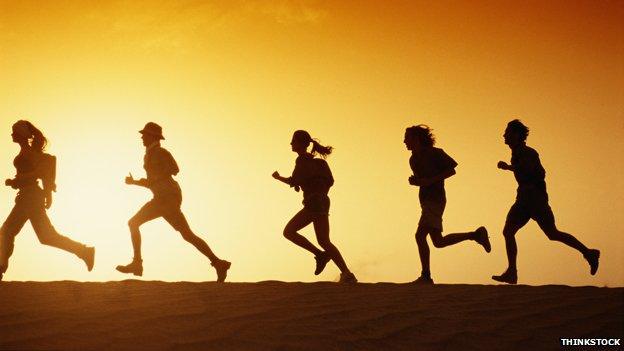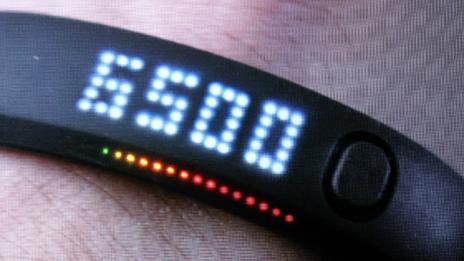Tech fitness products - how far will they run?
- Published
- comments

It's 0700 and I'm proud to tell you that after an early run, I've taken 5,445 steps, or actually 4,997 steps or maybe 4,545 steps - or perhaps I've acquired 1,543 fuel points, whatever they are.
All of this data comes from a couple of fitness bands and a smartphone app I've been trying out for a radio piece about this strange fad for measuring our daily activities. (You can hear it on The World At One on Wednesday).
For the last year or so the hot new trend has been wearable technology - all sorts of gadgets laden with sensors that will deliver us information or measure our lives in meaningful ways. The first real manifestation of this has come in the form of various fitness devices - mostly glorified pedometers that tell you how far you've moved.
But even before this idea has really hit the mainstream, doubts have set in. It has emerged that Nike has halted the development of its Fuelband, external and will henceforth concentrate on software. That may be because it is working with Apple on a fitness product, but there are still questions over just how big a market this is.
And some early adopters are already showing signs of fitness fatigue. Stuart Miles of the gadget blog Pocket-Lint was the man who sparked my interest in these devices last year. When we met up recently, he reminded me that I had once rung him late at night to say that I'd just managed to hit my Nike Fuelband target by doing star jumps in the living room.
But then he reveals that he's stopped wearing his Fuelband: "At first it's exciting. But after a while you fall into a pattern so you know what you're doing , you don't need something to tell you how you're doing that day - so after a while you take them off."
And Olivia Solon of wired.co.uk tells me that she'd been an enthusiastic Fitbit user for six months and like me, had found herself exercising somewhat manically late at night to hit her target. "But after about six months I got a data blindness, and stopped looking at the figures and as a result wasn't doing any more exercise. There's a gap between the data that you collect - and the need to do something about it."
We are however at the very early stages of wearable fitness monitors. Solon thinks the killer app could be a device that measures calorie intake ("that will be truly transformative") and the fitness firms have plans to collect far more data.

Nike has now halted development of its FuelBand
I puff up the stairs in my office with Jawbone's Jorgen Nordin, recording more steps on the Up band, which is his firm's fastest selling product. He explains what the future holds: "It's all about more sensors, we'll have them in our bodies, there'll be more sensors built into shoes and shirts or maybe earrings. There'll be multiple sensors that measure multiple data points - and all of these data points will allow us to provide even more valuable feedback to the end user."
Ah, but that is the question - who will really want all that data, and who will benefit from it? Privacy groups are beginning to take an interest in the sheer quantity of data that we are handing over when we sync our Nike Fuelbands or our Jawbone Ups to the cloud. Already some employers are introducing fitness bands - on a voluntary basis of course - to measure their employees' well-being. And at least one health insurance firm is offering lower premiums to customers who track their activities with one of these gadgets.
But we are all going to have to be far more interested in our own data - and convinced that tracking it can improve our lives - if these devices and apps are going to reach byond the niche of the "quantified self" movement.
Oh, by the way - I ended my day having taken 13,329 steps according to my Nike Fuelband, 14,309 if you believe the Breeze smartphone app, and 13,691 according to the Jawbone Up. Then, according to the Up, I slept for six hours and 24 minutes, with three hours, 32 minutes of sound sleep and two hours, 51 minutes of light sleep. It seems to me that what I need to do now is move less and sleep more - perhaps these gadgets can help after all.